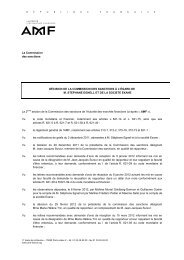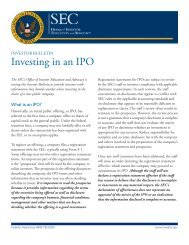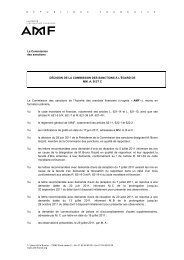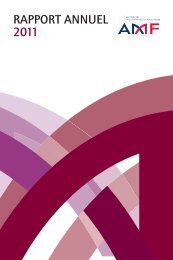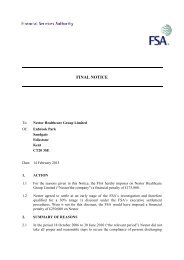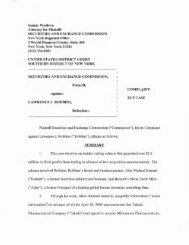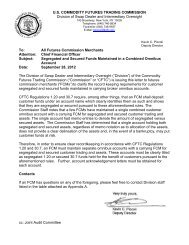The BRICS Securities and Derivatives Markets - Hong Kong ...
The BRICS Securities and Derivatives Markets - Hong Kong ...
The BRICS Securities and Derivatives Markets - Hong Kong ...
Create successful ePaper yourself
Turn your PDF publications into a flip-book with our unique Google optimized e-Paper software.
<strong>The</strong> <strong>BRICS</strong> <strong>Securities</strong> <strong>and</strong> <strong>Derivatives</strong> <strong>Markets</strong>4. INDIA<strong>The</strong>re are over 20 stock exchanges <strong>and</strong> over 20 commodity exchanges in India. Among thestock exchanges, the National Stock Exchange of India (NSE) <strong>and</strong> BSE Limited (BSE) arethe most prominent. <strong>The</strong>se two exchanges offer trading in stocks, ETFs, bonds <strong>and</strong> financialderivatives. <strong>The</strong> commodity exchanges offer trading in commodity futures while trading incommodity options is still prohibited. Among them, Multi Commodity Exchange of India(MCX), which became India’s first exchange to get listed on the BSE in March 2012, has thelion’s share by trading volume.<strong>The</strong> principal regulator in the Indian securities market (in legislative terms, “securities”includes financial derivatives) is the <strong>Securities</strong> Board of India (SEBI). It regulates stockexchanges, market intermediaries <strong>and</strong> other service providers <strong>and</strong> their activities, <strong>and</strong>promotes investor education <strong>and</strong> training of market intermediaries. <strong>The</strong> market for domesticgovernment securities (G-secs), which are traded both OTC <strong>and</strong> on exchange, is developed<strong>and</strong> managed by the Reserve Bank of India (RBI), the nation’s central bank. It also issuesG-secs on behalf of the Indian Government.At the policy level, the Ministry of Finance (MOF) is responsible for formulating polices <strong>and</strong>administering the relevant Acts for the regulation <strong>and</strong> development of the securities market;<strong>and</strong> the Ministry of Corporate Affairs (MCA) is primarily responsible for administering theActs governing the corporate sector.4.1 Key exchanges<strong>The</strong> NSE <strong>and</strong> the BSE are the most prominent stock exchanges in India — almost all cashmarket trading (equities <strong>and</strong> other securities, excluding financial derivatives) is done on thetwo exchanges, with the NSE having the lion’s share (81% in 2011/12 6 ). <strong>The</strong>se twoexchanges are also the only exchanges in India offering equity derivatives, in which tradingvolume is also dominated by the NSE (97%). Currently, only the NSE, MCX StockExchange (MCX-SX) <strong>and</strong> the United Stock Exchange of India (USE) offer currencyderivatives, in which the NSE has again the largest share by trading volume (47% in 2011/12),followed by MCX-SX (37%). (See Figure 4-1.)<strong>The</strong> NSE offers the trading of shares, warrants, mutual funds (including ETFs), fixed incomesecurities (include G-sec), futures <strong>and</strong> options contracts on equities, equity indices <strong>and</strong>currencies, <strong>and</strong> interest rate futures. <strong>The</strong> National <strong>Securities</strong> Clearing Corporation Limited(NSCCL), the NSE’s wholly-owned subsidiary, clears <strong>and</strong> settles the transactions of equity<strong>and</strong> financial derivatives.<strong>The</strong> BSE’s product offering is similar to the NSE’s except that the BSE does not offer tradingof interest rate futures <strong>and</strong> has suspended the trading of currency futures since April 2010.BOI Shareholding Limited (BOISL, 49% owned by the BSE) is the BSE’s clearing house forfunds <strong>and</strong> securities while Indian Clearing Corporation Limited (ICCL), the BSE’ssubsidiary, provides clearing <strong>and</strong> settlement services for the BSE’s mutual funds <strong>and</strong>corporate debt segments.6<strong>The</strong> financial year in India is from April to March the following year (the same convention is used for thisIndia section of the article).- 13 - Research & Corporate Development, HKEx31 December 2012



